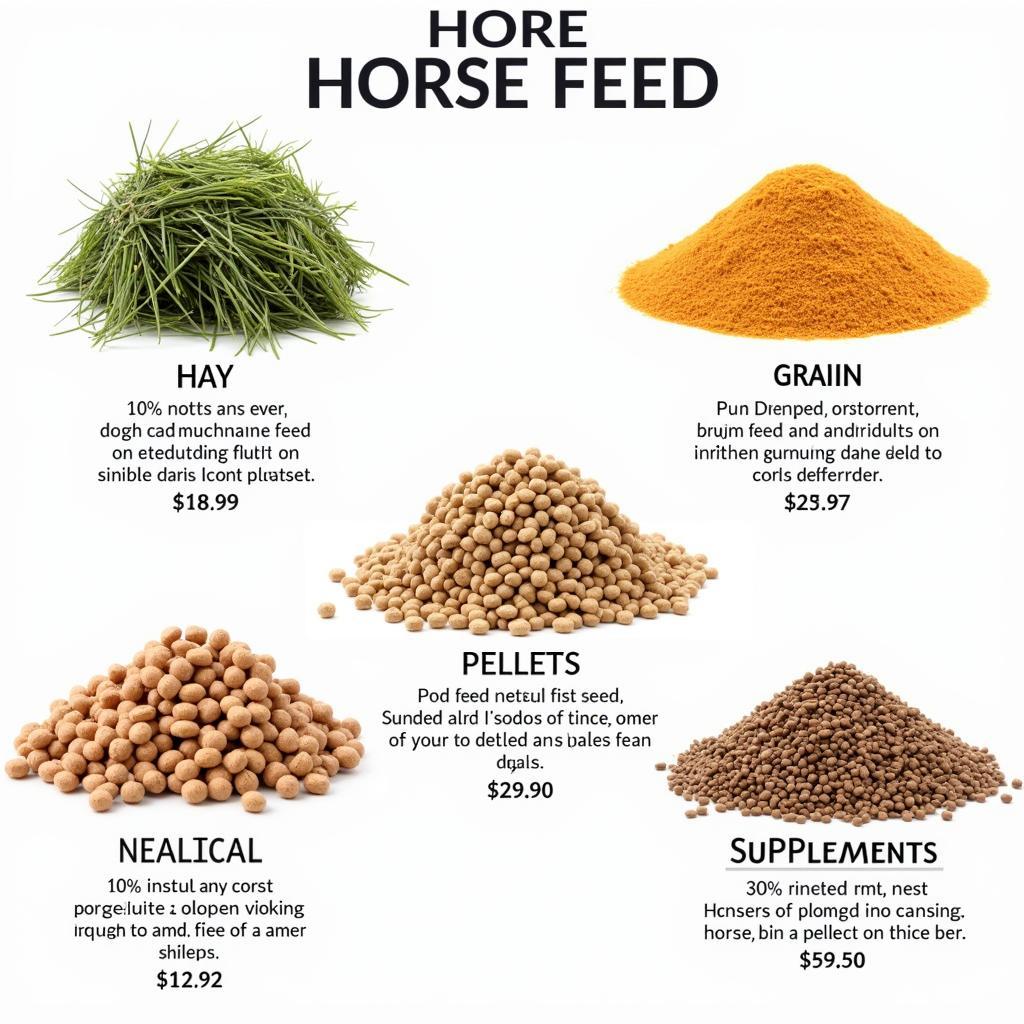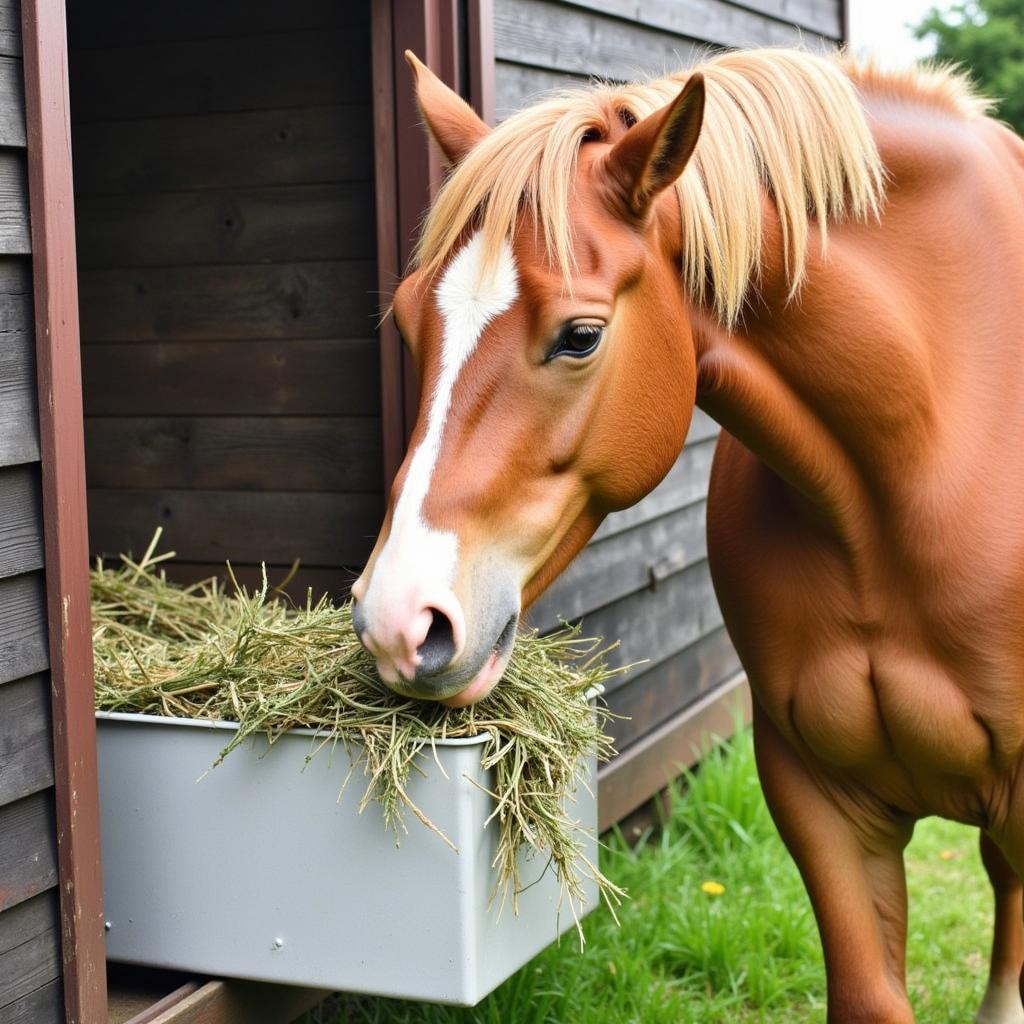Managing Horse Food Cost is a crucial aspect of horse ownership. From hay to supplements, understanding the factors that influence these costs can help you provide optimal nutrition without breaking the bank. This guide dives deep into the intricacies of horse feeding, offering valuable insights and practical advice for horse owners of all levels.
Factors Influencing Horse Food Cost
Several key elements contribute to the overall expense of feeding your horse. Understanding these factors allows for better budgeting and informed decisions.
- Type of Feed: The most significant factor is the type of feed you choose. High-quality hay, grain, and specialized supplements will naturally cost more than basic feed options. how much does horse food cost provides a detailed breakdown of the costs associated with different feed types.
- Horse’s Needs: A young, growing horse or a performance horse in intense training will require a different diet—and therefore a different budget—than a mature, lightly ridden horse. Factors like age, activity level, and metabolic needs play a crucial role.
- Geographic Location: Hay prices, for example, can fluctuate significantly based on regional availability and growing conditions. Transportation costs also contribute to the final price you pay.
- Time of Year: Just like any agricultural product, feed prices can be affected by seasonal changes. Hay shortages, for example, can drive up costs during winter months.
 Comparing Different Horse Feed Types
Comparing Different Horse Feed Types
Budgeting for Horse Food: Tips and Tricks
Effectively managing your horse food cost requires careful planning and smart strategies. Here are some practical tips to help you stay within your budget:
- Buy in Bulk: Purchasing hay and grain in bulk can often lead to significant savings, especially if you have ample storage space.
- Consider Slow Feeders: best slow feeders for horses can help reduce feed waste and promote healthy digestion, ultimately saving you money in the long run.
- Grow Your Own Forage: If you have the land and resources, cultivating your own hay or pasture can be a cost-effective solution, although it requires significant time and effort.
- Monitor Your Horse’s Weight: Regularly assessing your horse’s body condition score can help you adjust feeding portions accordingly, preventing overfeeding and unnecessary expense.
“Proper pasture management can drastically reduce your reliance on purchased feed, significantly impacting your overall horse food cost,” advises Dr. Emily Carter, Equine Nutritionist at the Equine Wellness Center.
 Horse Using a Slow Feeder
Horse Using a Slow Feeder
How Much Does Horse Food Cost: A Realistic Look
Providing a precise number for horse food cost is challenging due to the many variables involved. However, a general estimate for a healthy, adult horse on a basic diet might range from $100 to $300 per month. This can increase substantially for performance horses or those with special dietary needs. homemade electrolytes for horses can be a cost-effective way to supplement your horse’s diet.
Choosing the Right Feed for Your Horse
Selecting the right feed isn’t just about cost; it’s about providing optimal nutrition. Consider your horse’s individual needs, consult with an equine nutritionist, and prioritize quality ingredients. can horses eat wheat straw discusses the suitability of different types of straw for horses.
“Remember, the cheapest feed isn’t always the best value. Investing in high-quality nutrition can prevent health issues down the line, ultimately saving you money on vet bills,” says Dr. David Miller, DVM, specializing in equine care.
Conclusion: Balancing Cost and Quality in Horse Nutrition
Managing horse food cost is a continuous process that requires careful consideration of your horse’s individual needs and your budget. By understanding the factors that influence these costs and adopting smart feeding strategies, you can ensure your horse receives the optimal nutrition it deserves without overspending. Remember that prioritizing quality over the lowest price can often lead to long-term savings and a healthier, happier horse.
FAQ:
- What is the average horse food cost per month?
- How can I reduce my horse’s feed bill?
- What are the essential nutrients in horse feed?
- Is it cheaper to feed hay or grain?
- Can I feed my horse kitchen scraps?
- What are the signs of a nutritional deficiency in horses?
- How often should I deworm my horse?
For further information about horse shows in Connecticut, you can visit our page on horse shows ct.
When you need assistance, please contact us at Phone Number: 0772127271, Email: [email protected] or visit us at QGM2+WX2, Vị Trung, Vị Thuỷ, Hậu Giang, Việt Nam. We have a 24/7 customer service team.